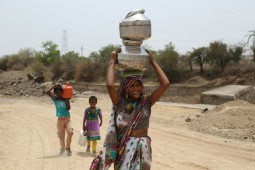Climate-sensitive WASH capacities

Why
Strengthening Local Climate-Sensitive and Universal WASH Capacities
Climate and environmental aspects are closely linked to the topics of water, sanitation and hygiene (WASH), as they have a direct impact on the availability and quality of water resources and on the infrastructure for sanitation. Climate change is increasingly leading to extreme weather events such as droughts and floods, which exacerbate water scarcity and jeopardise hygiene supplies in many regions. At the same time, inadequate sanitation contributes to environmental pollution, for example through the contamination of water bodies with untreated wastewater. Sustainable WASH systems therefore play a central role in adapting to climate change and reducing environmental pollution by ensuring access to safe drinking water, recycling wastewater and promoting hygienic living conditions. Such approaches are essential to protect the health of the population and preserve ecosystems at the same time.
The ECT WASH project, “Environmentally Sound and Climate Resilient Transformation of Humanitarian WASH”, aims to promote climate-resilient and environmentally sustainable water, sanitation, and hygiene services. The focus is on strengthening local capacities to improve access to clean water and adequate sanitation while integrating climate-sensitive and ecologically sustainable approaches into humanitarian actions.
In collaboration with the Arbeiter-Samariter-Bund (ASB), arche noVa e.V., and local partner organizations, the program is implemented in countries particularly affected by climate change and natural disasters. Target countries include:
- Africa: Niger, Mali, Somalia/Somaliland, Ethiopia
- Asia: Myanmar, Philippines, Indonesia, Bangladesh
- MENA Region: Lebanon, Iraq
- Central America and the Caribbean: Nicaragua, Honduras, Haiti
The project adopts a holistic approach by integrating climate, environmental, and inclusive aspects into all phases of humanitarian WASH interventions. Special emphasis is placed on anticipatory humanitarian action and disaster risk management. The application of Green Humanitarian Assistance reduces the environmental impact of humanitarian aid while adapting measures to the specific climate and environmental risks. This not only helps protect lives and livelihoods but also contributes to the global goal of universal access to water and sanitation.
The German Toilet Organization plays a central role in building the capacities of project implementers, fostering networking and knowledge exchange within the WASH sector, and advancing the dissemination of innovative, climate-resilient approaches through international partnerships.
Facts
- 389climate-related disasters were counted in 2020.
- 1%is the annual increase in global water consumption.